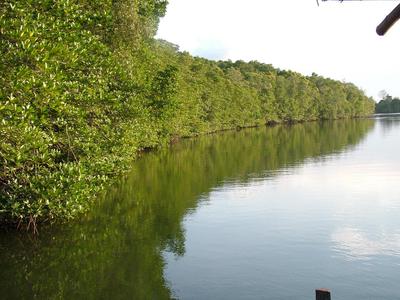
Community-based replanting of mangroves at Muara Sedili Kechil.
Imagine you’re at a beach. A nice one with no plastic bag or drink can litter. And you start to dig a hole in the sand. The more you dig, the more the incoming tide drops sand into the hole. It is a never-ending task, but you keep doing it anyway. As Sarala Aikanathan, director of the Wetlands International (WI) Malaysian branch puts it “being an environmentalist, is not just about doing the job. It is a job you do because it is part of your soul.”
Wetlands International is a science-based organisation that assists governments in the protection and restoration of wetlands. That can be anything from coral reefs, mangrove swamps, mudflats, peatlands, and even aquaculture ponds. With 20 international offices and headquarters in the Netherlands, its mission is to sustain and restore wetlands, their resources and biodiversity.
Sarala’s interest in the environment started at an early age, always playing with butterflies, caterpillars, tadpoles and such. She went on to study marine biology, with particular interest in coastal ecology.
Although the first time she went to a mangrove, she ended up covered in smelly mud and having to take a bus home, she was not put off. “When, the next day the professor asked me if I still wanted to study wetlands I said yes,” she says.
Now, as a full-time organizer for WI, she is deeply involved with many projects across Malaysia, including rehabilitating degraded mangrove areas in Johor. This project is just one that calls on the participation of both the local community and on local corporate support.
But doing the right thing for the environment, long term, is not always easy. For instance, in one of her early projects, she spent six months in 1988 in Trengganu, Malaysia studying leather back turtles along the coast.

Sarala: "Stop the lip service.
"“It’s easy to sit in an office and say, collecting turtle eggs should be made illegal,” says Sarala. “But when you live with the people who make a living from the sea, you know that the solution is not so easy.” Telling the local fishermen not to collect turtle eggs meant taking away their livelihood. “And livelihood has to be managed with the environment,” she adds.
WI’s work concentrates on maintaining and restoring the functions of wetlands across the globe. They have many functions, including acting as filters for water sources such as rivers and lakes. They also provide buffer zones for coastal areas against storms and tsunamis – one of the reasons for the devastation in the recent tsunami was the lack of wetland barriers at the ocean’s edge.
They also help filter pollutants such as sewage, nitrogen and phosphorus fertilizer agricultural runoff, and heavy metals from industrial waste. Wetlands can act like giant sponges. They soak up rain and slowly release this water in drier seasons. And most importantly for twitchers, they provide a permanent and migratory habitat to a wealth of species of plants, fish and wildlife.
To make sure the wetlands in Malaysia are safe from erosion – both natural and human impacts – WI works with local people, governments, NGOs and the private sector. This involves some delicate negotiating, and balancing of individual needs and requirements. But it does not have to mean any one section of the community needs to miss out, says Sarala.
“Us living well does not have to come at the expense of environmental degradation. The way I feel about Mother Nature can be explained as: ‘There is a sufficiency in the world for man's need but not for man's greed’, as very well put by Mahatma Gandhi,” she says.
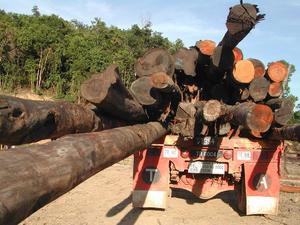
Peatland forests logged faster than any other forest types.
One area that the Malaysian branch of WI is currently applying this approach to is the ongoing research into peatlands in Malaysia, which will then be used to form the basis for sustainable management policies. In this, WI has established that governments undoubtedly play a major role. Without political will, developments that bring in money, but cause the destruction of coral reefs, or landslides or pollute water sources will continue to be built.
But Sarala thinks that things are changing for the better. “I’ve been doing this for over 20 years an I can see that the relationship between NGOs and government is changing. NGOs used to be called anti-development, but now are seen as consultants in projects,” she points out. The Government of Malaysia has been a country member of Wetlands International since 2002.
In Malaysia, WI has been instrumental in the country's accession to the Ramsar Convention in 1994 with the designation of Tasek Bera as the country's first Ramsar site. WI has also developed several major regional programmes on waterbird and wetland monitoring and conservation action, including the Asian Waterbird Census (since 1991), the Asia-Pacific Migratory Waterbird Conservation Strategy (1996-2006) and the Asian Wetland Inventory (1999-2004).
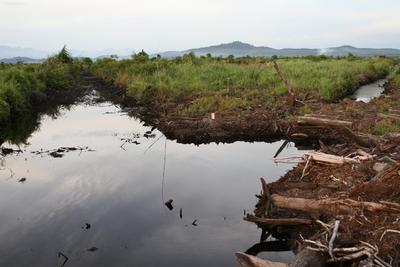
Drainage and degradation of peatlands.
Another significant initiative is underway at the Royal Selangor Golf Club (RSGC). The site has 360 acres of fairways, tees and greens – with 30 acres designated as the wildlife and bird sanctuary. However, existing ponds have deep edges unsuitable for wetland waterbirds to feed, and food sources are limited due to low numbers of aquatic plant species, aquatic insects and fish. WI is currently conducting a survey to give RSGC the data to rectify these issues and restore the wetlands to their full potential.
The one group that Sarala feels has really not stepped up to the green plate is the private sector. “I think the private sector pays lip service to ecological work, rather than the real thing,” she notes. She says they should literally get their hands dirty and do something for the environment. “Although we can’t get rid of everything that impacts the environment, at least we cannot take the environment for granted,” she asserts.
“For instance if a company deals with chemicals – then get involved in river clean up. If they use a lot of wood pulp, then plant trees,” she says. “I feel that the government wants to make a difference, but I don’t feel that way about private sector.”
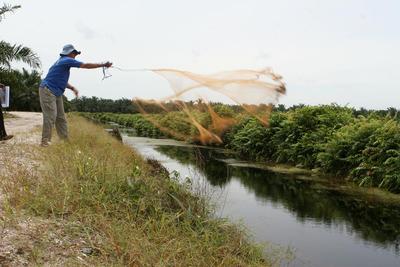
Freshwater fish sampling.
Sarala believes that the biggest hope lies with the next generation. “Knowledge is a big thing now with kids. Children really do want to do the right thing,” she says. She points out that parents and teachers should work together to encourage children to explore the outside world. But this has to start early, and become part of their souls.
So what will it take to change interest to action? Sarala believes this happens when the environment stirs a person’s heart. “Maybe it’s when you see a living thing in the wild, or you watch indigenous people practicing an age old craft – when you realise the world will be a poorer place if this goes away. That’s when I think a person will start to make a difference.”
Other Wetlands International Initiatives:
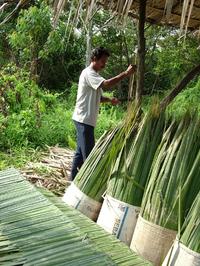
Semelai community resource management.
- Seedling preparation and planting on Hurah Islands, Maldives in an area that was affected by the 2004 Asia Pacific tsunami.
- Community-based mangrove reforestation in Aceh that aims to reduce poverty and coastal vulnerability by encouraging community groups to recreate a mangrove aquaculture ecosystem in Aceh.
- Developing Community Based Mangrove Replanting and Monitoring in Sedili Kecil Mangrove, Johor
For more information, visit Wetlands International www.wetlands.org